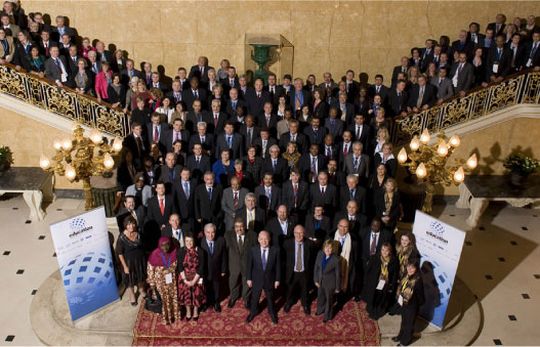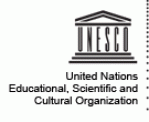UNESCO chief stresses need for innovation to ensure equitable education
UNESCO chief stresses need for innovation to ensure equitable education
 Group photo of some of the delegates attending the Education World Forum taking place in London – EWF/David Weston
Group photo of some of the delegates attending the Education World Forum taking place in London – EWF/David Weston
The head of the United Nations agency tasked with promoting education today underscored the role that information and communications technologies can play in ensuring quality education and equal opportunities to learning even in countries that lag behind because of limited resources.
“Progress is more than a question of money – it is all about matching. Matching capacity with needs,” Irina Bokova, the Director-General of the UN Educational, Scientific and Cultural Organizations (UNESCO), told delegates at the Global Summit for Education Ministers under way in London.
“This means making the most of innovation, notably in technology. It means building innovative partnerships with the private sector, such as through the Global Alliance of Corporate Partners for Education that we are aiming to establish this year,” Ms. Bokova told the forum, whose theme is ‘Learning from the Best for a World of Change.’
I am convinced public-private partnership is a new form of ‘civilian power’ that will help shape the 21st century.
She underlined the need to make education a “transformational power for human dignity,” as well as for social, economic and political change.
“In times of economic uncertainty, this message has never been so important,” Ms. Bokova added.
The younger generation required an education that equips them with modern skills and utilizes new technologies for the labour market, she said.
“Technology can be a powerful education multiplier – but, for this, it must be integrated into learning and accompanied by new teaching styles. In many countries, this calls for a profound shift towards more interactive, project-based learning,” she said.
She pointed out that UNESCO is working to improve the skills of teachers and to promote competency standards through its ‘Information and Communication Technology Competency Framework for Teachers’ project, which sets guidelines to help educators develop skills to make the best use of technology for improved learning.
“Research shows that the success in using information and communication technologies in education depends largely on the ability of teachers to integrate these technologies into the teaching process,” she said, stressing that the UNESCO framework is a core part of its vision to provide global leadership for teacher training.
The framework, which can be downloaded from the UNESCO website, is a collaboration between private sector partners, such as Cisco, Intel and Microsoft, as well the International Society for Technology in Education and experts from the Commonwealth of Learning.
“I am convinced public-private partnership is a new form of ‘civilian power’ that will help shape the 21st century,” she said.
She also stressed the need to make education build socially stable communities through the promotion of good citizenship and respect for human rights. She announced that UNESCO will next week launch an initiative with the United States on teaching respect for all – a new curriculum on anti-racism and tolerance.
On primary school enrolment, Ms. Bokova said that despite an impressive improvement since 2000, the world is still not on track to meet the goal of universal basic education by 2015.
There were 67 million children out of primary school in 2007, and a similar number of adolescents out of secondary school. An estimated 793 million adults across the world remain illiterate – two thirds of them women.
An additional 1.9 million teachers are needed to achieve universal primary education by 2015, she added.
###
About UN Educational Scientific and Cultural Organization (UNESCO)

UNESCO works to create the conditions for dialogue among civilizations, cultures and peoples, based upon respect for commonly shared values. It is through this dialogue that the world can achieve global visions of sustainable development encompassing observance of human rights, mutual respect and the alleviation of poverty, all of which are at the heart of UNESCO’S mission and activities.
The broad goals and concrete objectives of the international community – as set out in the internationally agreed development goals, including the Millennium Development Goals (MDGs) – underpin all UNESCO’s strategies and activities. Thus UNESCO’s unique competencies in education, the sciences, culture and communication and information contribute towards the realization of those goals.
UNESCO’s mission is to contribute to the building of peace, the eradication of poverty, sustainable development and intercultural dialogue through education, the sciences, culture, communication and information. The Organization focuses, in particular, on two global priorities:
- Africa
- Gender equality
And on a number of overarching objectives:
- Attaining quality education for all and lifelong learning
- Mobilizing science knowledge and policy for sustainable development
- Addressing emerging social and ethical challenges
- Fostering cultural diversity, intercultural dialogue and a culture of peace
- Building inclusive knowledge societies through information and communication
###
> United Nations (UN).
 The United Nations was established on 24 October 1945 by 51 countries committed to preserving peace through international cooperation and collective security. Today, nearly every nation in the world belongs to the UN: membership totals 192 countries.
The United Nations was established on 24 October 1945 by 51 countries committed to preserving peace through international cooperation and collective security. Today, nearly every nation in the world belongs to the UN: membership totals 192 countries.
When States become Members of the United Nations, they agree to accept the obligations of the UN Charter, an international treaty that sets out basic principles of international relations. According to the Charter, the UN has four purposes:
- to maintain international peace and security;
- to develop friendly relations among nations;
- to cooperate in solving international problems and in promoting respect for human rights;
- and to be a centre for harmonizing the actions of nations.
###
* The above story is adapted from materials provided by United Nations (UN)
** More information at United Nations (UN)




















